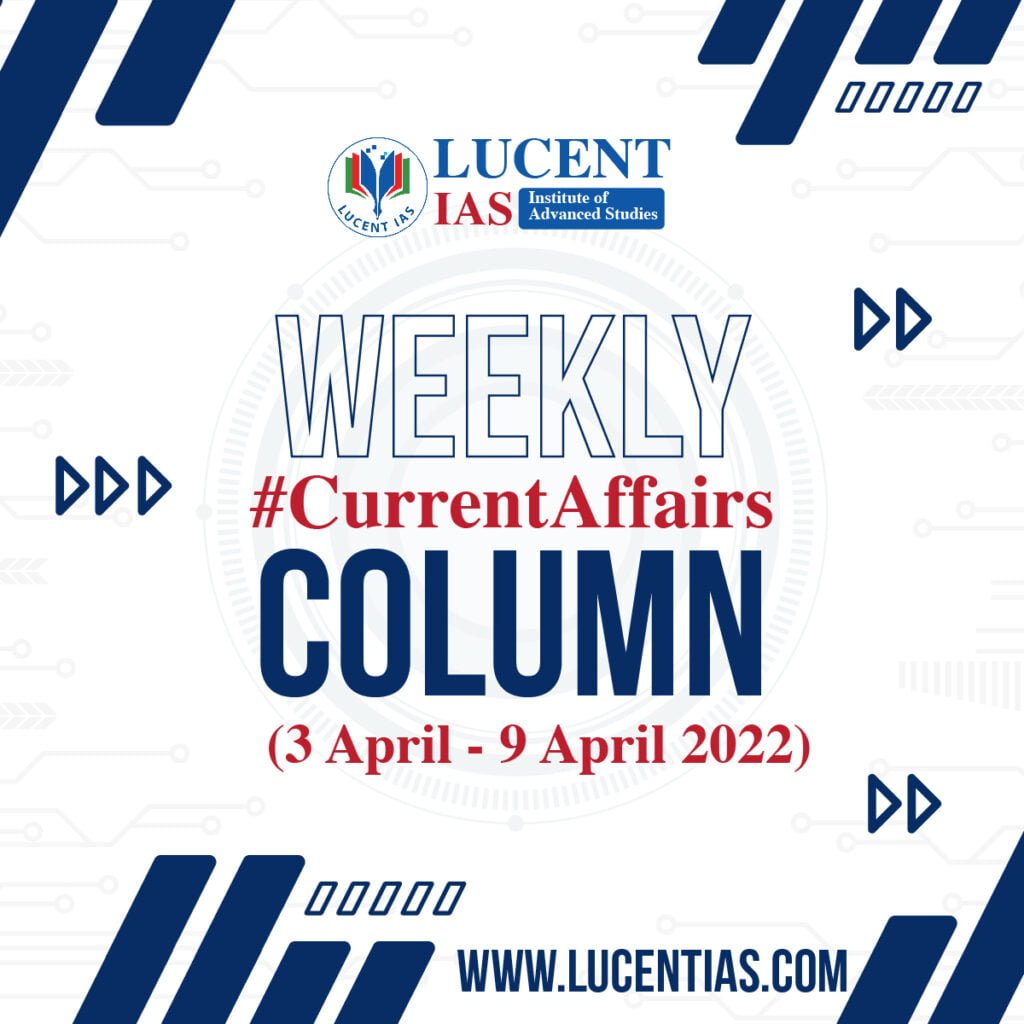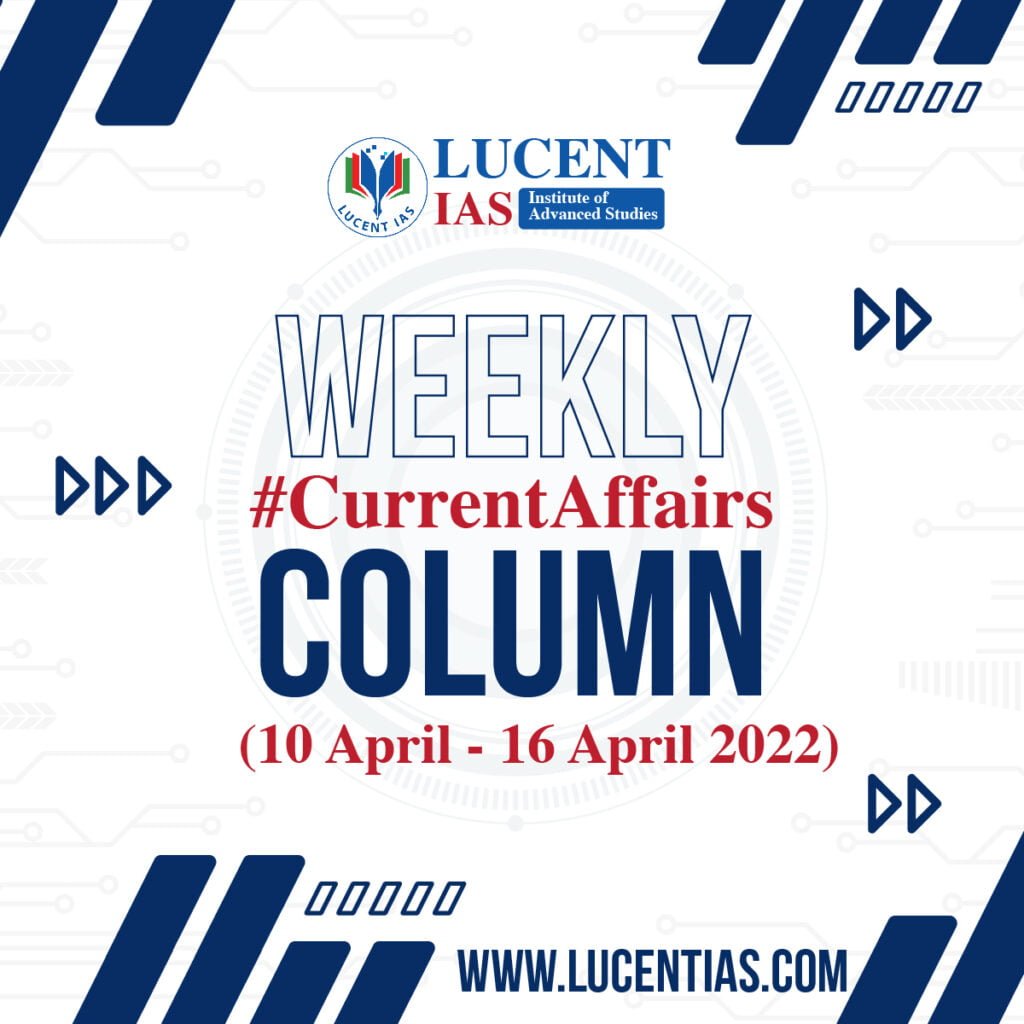In this Weekly Current Affairs Column, Columnist Mr. Kaustav Pallav provides key insights on a few selected and important news and development in the past week. (24th April to 30th April, 2022)
Dear readers,
The previous week has been uneasy. With heat waves continuing to hound people of Delhi, the demand for power has significantly increased creating a power crisis situation (because of shortage of coal supply) in the national capital region. Indian Railways has cancelled about 42 passenger trains to allow more coal rakes to ensure faster delivery that the possibility of a power crisis can be negated. This raises several questions and at the same time also highlights the requirement of the dedicated freight corridors as much important. Scientists exclaim that heat waves are linked to manmade climate changes, have suggested reduction in carbon dioxide emissions urgently. They remark that India can do away with 50% pollution by merely providing clean cooking fuel to rural households in the Indo-Gangetic plains. On the other hand, while Indian oil refiners negotiate a six month deal to import millions of barrels of oil per month from Russia despite the western sanctions, India has already imported more than twice as much crude oil from Russia than in the previous year in the past two months! Here, US while criticising Russia’s attempt to stage fake independence votes to justify its conquest of Ukrainian territory has demanded that such referendum will not be accepted by the international community.
To talk to you about a few more developments,
“Mother nature” a living entity, so says Madras HC
Justice S. Srimathy invoked “parens patriae jurisdiction” to declare mother nature as a legal living entity therefore conferring upon it all legal, constitutional and fundamental rights so needed for its survival, safety and resurgence. The court in one petition observed that destruction of nature and that by a few powerful individuals shall ultimately endanger the very existence of flora, fauna, water bodies, mountains, glaciers and humans and directed the government to protect mother nature in all possible ways. The High Court also observed that natural environment is part of basic human rights, of “right to life” itself.
Economy likely to overcome Covid losses by FY35
Report on currency and finance (RCF) by RBI opines that the economy may take a decade’s time to overcome the losses caused by the global pandemic. RCF suggests that the changes induced because of the pandemic might essentially affect the growth trajectory while indicating a periodical rebalancing of monetary and fiscal policy as the first step to deal with the situation. The contributors to RCF also maintain a stable price condition as necessary for strong and sustainable growth.
China’s Global Security initiative
Chinese President this week while confronting hegemonism, power politics and bloc formation announced Global Security initiative. This initiative specifically intends to counter Quad grouping, oppose unilateralism and pledges commitment to common, comprehensive and sustainable security. China says that it believes that small groups or circles like Quad and AUKUS would destroy the international order and would drag the world to a new era of cold war, opposing which it proposes to build an Asian model of security based on integration, openness and mutual respect.
Countries to justify veto votes at UN
The General assembly this week taking a resolution by consensus to make the permanent members responsible for their vetoes against resolutions at UNSC and make them pay a greater political price for the same. This measure first proposed two years ago also provides for the General Assembly to assemble within 10 working days after a veto and to hold a discussion on the matter to which the veto was cast. Reforms in the UN have been demanded by several countries and that this push comes in with Russia invading Ukraine. While most countries have joined Leichtenstein in co-sponsoring the reform, Russia and China have kept themselves away.
CBDT aims to lift tax-GDP ratio
With net direct taxes amounting to Rs. 14.09 lakh crore being collected this year (FY 22) as against Rs. 9.45 lakh crores in FY 21, CBDT suggests that this signals revival of Indian economy after the pandemic affecting it for two long years. It says the collection has registered a growth of around 49%. This has led to direct taxes surpassing the collection from indirect taxes which was otherwise in the previous years. CBDT says it aims to raise the tax-GDP ratio to 15-20% in the next five years from the present 12%.
India third highest spender on military
Stockholm international peace research institute has published new data on global military spending which says that expenditure on military has increased despite the pandemic situation. The report says that the five highest spender together accounts for 62% of the global spending. India trying to modernise its military with difficult border situations with China and Pakistan spends around $76.6 billion, ranking third and has increased its expenditure on military by 33% since 2012. The report also suggests that the global expenditure has increased only because of China and India increasing their expenditures respectively.
That is all of the previous week, readers. With new hopes and new stories, we shall meet again the next week. Until then, take very good care of yourselves and everyone around.
Yours truly,
Kaustav Pallav



